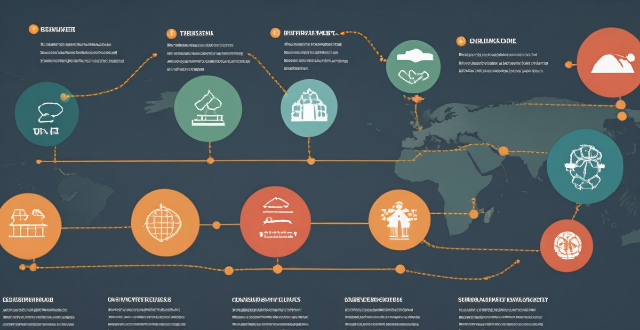Global Environmental

How does international environmental law address global warming ?
International environmental law plays a crucial role in addressing global warming by setting standards, encouraging cooperation, and promoting sustainable practices through treaties, agreements, and principles. The Framework Convention on Climate Change (UNFCCC), the Kyoto Protocol, and the Paris Agreement are key legal instruments that establish targets for reducing greenhouse gas emissions and provide mechanisms for compliance and financial support. Other initiatives such as Regional Seas Programmes, the Convention on Biological Diversity (CBD), and Forest Law Enforcement, Governance and Trade (FLEGT) also contribute to mitigating climate change. Challenges include enforcement, political will, and ensuring equity and justice in actions taken. As the fight against global warming continues, international environmental law must adapt to evolving scientific, political, and technological landscapes, requiring collaboration and innovation among nations.

How does environmental degradation affect global ecosystems ?
Environmental degradation affects global ecosystems in various ways, including loss of biodiversity, disruption of ecosystem services, changes in the carbon cycle, and impact on human health. It is crucial to take steps to mitigate environmental degradation and protect our planet's ecosystems for future generations.

What are the current global health challenges ?
The world is facing a multitude of health challenges that require immediate attention and action, including infectious diseases, non-communicable diseases, mental health issues, and environmental health hazards. Infectious diseases such as COVID-19, HIV/AIDS, tuberculosis, and malaria continue to be a major threat to global health. Non-communicable diseases like cardiovascular diseases, cancer, diabetes, and chronic respiratory diseases are becoming increasingly prevalent globally. Mental health disorders, including depression, anxiety disorders, and substance abuse, are a growing concern worldwide. Environmental factors such as air pollution, water pollution, climate change, and natural disasters also pose significant risks to human health.

What role do international agreements play in shaping national climate and environmental policies ?
International agreements significantly influence national climate and environmental policies by providing a platform for global collaboration, setting shared objectives, establishing guidelines, promoting cooperation, and enhancing transparency and accountability. Examples include the UNFCCC, CBD, Basel Convention, Montreal Protocol, and Ramsar Convention, which have shaped policies on climate change mitigation, biodiversity conservation, waste management, ozone layer protection, and wetland preservation, respectively. These agreements are crucial for addressing global environmental challenges and driving progress towards sustainability.

How can international cooperation on climate change contribute to global security ?
International cooperation on climate change is vital for global security. It helps mitigate environmental disasters, promotes economic stability and growth, enhances social cohesion and peace, facilitates technology and knowledge sharing, and strengthens global governance and diplomacy. Through joint efforts, nations can address one of the most pressing challenges of our time and secure a safer future for all.

Can environmental legislation effectively reduce pollution ?
Environmental legislation has the potential to effectively reduce pollution, but its success depends on various factors such as enforcement and compliance, public awareness and participation, technological innovation, political will, international cooperation, and economic considerations. Strong regulatory bodies, education campaigns, investment in clean technology, government prioritization of environmental protection, global collaboration, and balancing environmental goals with economic development are all crucial for the effectiveness of environmental legislation. Achieving lasting improvements in environmental quality requires ongoing effort from all sectors of society.

How do economic systems contribute to environmental problems and climate change ?
Economic systems, especially capitalism and industrialization, significantly impact the environment by promoting overproduction, waste, and reliance on fossil fuels. Issues such as built-in obsolescence, global trade emissions, and exploitation of natural resources exacerbate environmental problems. Additionally, population growth and urbanization increase consumption, while market failures and regulatory gaps often overlook environmental costs. Addressing these challenges requires a shift in economic priorities towards sustainability.

How does education contribute to raising environmental awareness among future generations ?
Education is crucial for raising environmental awareness among future generations, as it enhances knowledge, develops values, and promotes action. Incorporating environmental education into the curriculum empowers students with the necessary tools to understand and address complex challenges facing our planet. By fostering a deeper appreciation for nature and cultivating a sense of responsibility towards preserving it, schools can play a significant role in nurturing eco-conscious citizens who are well-equipped to confront and overcome environmental challenges.

What are the latest trends in the global economy ?
The global economy is influenced by various interconnected factors including digital transformation, sustainability, global trade dynamics, monetary policies, and the rising influence of emerging markets. These trends are reshaping industries, fostering innovation, and influencing economic growth and policies worldwide.

How can education promote environmental ethics ?
Education is crucial for fostering environmental ethics among students by integrating interdisciplinary approaches, real-world examples, and skill development. Experiential learning through field trips, hands-on projects, and community engagement helps instill a deeper connection with nature. Teaching sustainable practices like reducing waste and conserving energy encourages responsible resource management. Encouraging critical thinking through debates and research assignments enhances understanding of complex environmental issues. Cultivating empathy and responsibility involves promoting nature connectivity and global perspectives. Assessment and reinforcement strategies such as project-based assessments and recognition programs help evaluate and motivate students' commitment to environmental stewardship.

How does global shopping affect local businesses ?
Global shopping has become increasingly popular due to the rise of e-commerce platforms and international shipping services. While it offers consumers a wider range of products and competitive prices, it also poses challenges for local businesses such as increased market competition, job displacement, cultural homogenization, environmental impact, intellectual property rights issues, and economic dependency. As consumers continue to embrace global shopping, it is crucial for local businesses to adapt and find ways to differentiate themselves in order to remain competitive and sustainable in the long run.

What role does natural gas play in the global energy market ?
Natural gas is a key player in the global energy market due to its environmental advantages, economic benefits, contributions to energy security, technological advancements, and versatile applications across sectors.

How does TCFD align with other global reporting initiatives like the Global Reporting Initiative (GRI) ?
The Task Force on Climate-related Financial Disclosures (TCFD) and the Global Reporting Initiative (GRI) are two global sustainability reporting frameworks that share several key points of alignment. Both provide guidelines for companies to report on their sustainability performance, with TCFD focusing specifically on climate-related financial disclosures and GRI covering a broader range of sustainability issues. They also emphasize the importance of materiality assessment, stakeholder engagement, risk management, and climate change disclosures in determining which aspects are most relevant to an organization's business model and strategy. By following both frameworks, companies can provide a more comprehensive picture of their sustainability performance and demonstrate their commitment to addressing climate change and other sustainability issues.

What are the most effective ways to promote environmental awareness ?
Promoting environmental awareness is crucial for the sustainable development of our planet. Effective ways to raise awareness about environmental issues include education and training through school curriculums, community workshops, and online courses; media and public outreach via social media campaigns, public service announcements, and documentaries; corporate responsibility initiatives such as green marketing, CSR programs, and partnerships with NGOs; and government policies and initiatives including environmental legislation, eco-friendly infrastructure, and international cooperation. By implementing these strategies, we can create a more informed and engaged global community committed to protecting our environment for future generations.

How has environmental legislation evolved over time ?
Environmental legislation has evolved over time, reflecting growing awareness of environmental issues. Early stages focused on preserving natural resources and conserving wildlife habitats, while post-World War II saw a shift towards pollution control through air and water quality regulations. The late 20th century introduced comprehensive environmental protection laws addressing multiple aspects of environmental degradation. Today's legislation prioritizes sustainable development and climate change mitigation, with a focus on public participation and transparency in decision-making processes.

How does environmental legislation differ across countries ?
Environmental legislation varies across countries due to differences in economic development, political systems, cultural values, and environmental priorities. The legal framework for environmental protection ranges from comprehensive laws covering various issues to piecemeal legislation addressing specific problems. Enforcement mechanisms also differ, with some countries having strong regulatory bodies and others lacking institutional capacity or political will. Penalties and sanctions for non-compliance vary widely, as do opportunities for public participation in decision-making processes. International cooperation is crucial but varies in commitment and action among countries. Overall, these differences highlight the need for greater coordination and cooperation to address global environmental challenges effectively.

Have any celebrities started their own environmental organizations or foundations ?
This text discusses the environmental organizations and foundations founded by celebrities such as Leonardo DiCaprio, Emma Watson, Prince Harry and Meghan Markle, and Jane Goodall. The organizations focus on various environmental causes, including protecting wildlife, combating climate change, promoting sustainability, and addressing social justice issues related to the environment.

How do environmental subsidy policies impact economic growth ?
The text discusses the impact of environmental subsidy policies on economic growth, highlighting both positive and negative effects. Positive impacts include stimulating innovation and technology development, enhancing energy efficiency, creating job opportunities, and improving public health. Negative impacts encompass distorting market incentives, increasing government expenditures, potential for carbon lock-in, and global trade implications. It concludes that while environmental subsidies have the potential to foster economic growth, they must be carefully designed to avoid adverse effects and contribute positively to sustainable economic development.

How do international trade agreements influence environmental policies and sustainability efforts ?
International trade agreements significantly influence environmental policies and sustainability efforts through harmonization of standards, potential for environmental dumping, promotion of green trade practices, and challenges in balancing trade liberalization with environmental protection. These agreements can either elevate global environmental standards or lead to a race to the bottom in regulatory protections. Policymakers must navigate the complexities of these agreements to ensure they support sustainable development goals without undermining environmental commitments.

What is the cost of implementing carbon sequestration on a global scale ?
The cost of implementing carbon sequestration on a global scale varies depending on the method used, the location, and other factors. The cost per ton of CO2 removed ranges from $10-$600 for different methods such as afforestation, reforestation, direct air capture, and enhanced weathering. The total cost for global implementation ranges from $100 billion to $6 trillion per year. Several factors affect the cost, including technology development, economies of scale, policy support, social acceptance, and environmental impact. While the initial costs may be high, the long-term benefits of mitigating climate change make it a worthwhile investment.

What role do international sports organizations play in fostering global cooperation ?
International sports organizations are crucial for global cooperation, promoting peace, cultural exchange, economic development, health, gender equality, environmental sustainability, and humanitarian aid.

What is the role of individuals in addressing climate change and environmental degradation ?
This article discusses the role of individuals in combating climate change and environmental degradation. It highlights the cumulative impact of individual actions, their potential to inspire others, and the political pressure they can exert. The article provides practical steps individuals can take, such as reducing their carbon footprint, supporting renewable energy, waste reduction and recycling, advocating for environmental policies, and spreading awareness. It emphasizes that collective efforts can make a significant difference in creating a more sustainable future for our planet.

How effective are ecological taxes in reducing environmental pollution ?
Ecological taxes, also known as environmental or green taxes, aim to reduce pollution and promote sustainable practices by making polluting activities more expensive than environmentally friendly alternatives. The effectiveness of these taxes depends on factors such as tax rates, revenue use, public awareness, and international cooperation. Case studies show that carbon taxes, plastic bag taxes, and waste taxes can lead to reduced emissions and waste, but challenges include revenue neutrality, equity concerns, and the need for global agreements. To maximize their impact, ecological taxes should be part of a broader strategy that includes regulatory measures, public education, and support for green innovations. Recommendations for effective implementation include ensuring adequate tax rates, allocating revenue for environmental initiatives, increasing public awareness, protecting low-income earners, and fostering international collaboration.

How do people's attitudes towards climate change affect their willingness to take action on environmental issues ?
The text discusses how attitudes towards climate change influence environmental action. It identifies factors like awareness, emotional connection, responsibility, barriers, and incentives that shape willingness to act on environmental issues.

How do climate change negotiations affect global trade and economic systems ?
Climate change negotiations play a crucial role in shaping global trade and economic systems. These negotiations aim to find solutions to the challenges posed by climate change, such as reducing greenhouse gas emissions, promoting renewable energy sources, and protecting biodiversity. The outcomes of these negotiations have far-reaching implications for international trade, investment, and economic development. In this article, we will explore how climate change negotiations affect global trade and economic systems. One of the key impacts of climate change negotiations on international trade is the imposition of tariffs and subsidies on goods and services that contribute to climate change. For example, countries may impose higher tariffs on imported goods that are produced using high levels of carbon emissions or other environmentally harmful practices. Similarly, governments may provide subsidies to domestic industries that adopt sustainable practices or invest in renewable energy technologies. These measures can create trade barriers and distort market competition, affecting global trade patterns. Another way in which climate change negotiations can influence international trade is through the implementation of carbon pricing mechanisms, such as carbon taxes or cap-and-trade systems. These mechanisms aim to internalize the external costs of carbon emissions by making polluters pay for their emissions. As a result, companies that rely heavily on fossil fuels or produce high levels of emissions may face increased costs, making their products less competitive in global markets. On the other hand, companies that invest in low-carbon technologies or adopt sustainable practices may gain a competitive advantage. Climate change negotiations often lead to the adoption of stricter environmental standards and regulations at both national and international levels. These standards can affect international trade by creating compliance costs for exporters and importers. For instance, companies that export goods to countries with stringent environmental regulations may need to invest in cleaner production processes or face penalties for non-compliance. Similarly, importers may prefer to source goods from suppliers that meet certain environmental standards, affecting trade flows and market access. Climate change negotiations also have significant implications for investment and economic development. As countries commit to achieving ambitious climate targets, there is an increasing demand for green finance and investment in sustainable projects. This can create new opportunities for investors and businesses that focus on renewable energy, energy efficiency, and other low-carbon sectors. However, it can also lead to capital flight from traditional fossil fuel industries, affecting economies that rely heavily on these sectors. Climate change negotiations often include provisions for technology transfer and innovation cooperation between developed and developing countries. This can help bridge the gap between countries with different levels of technological capabilities and promote sustainable development worldwide. By facilitating the transfer of clean energy technologies and supporting research and development efforts, climate change negotiations can foster economic growth and job creation in emerging markets. Finally, climate change negotiations address the urgent need for adaptation financing and support for vulnerable communities affected by climate change. This includes funding for infrastructure improvements, disaster risk reduction, and other measures that help countries adapt to changing climate conditions. While these efforts are essential for protecting human lives and livelihoods, they also represent significant economic opportunities for businesses involved in climate resilience and adaptation services. In conclusion, climate change negotiations have far-reaching implications for global trade and economic systems. By imposing tariffs and subsidies, implementing carbon pricing mechanisms, setting environmental standards, promoting green finance and investment, facilitating technology transfer and innovation, and providing adaptation financing and support, these negotiations shape the future direction of international trade and economic development. As we continue to grapple with the challenges posed by climate change, it is crucial for policymakers, businesses, and civil society to work together to ensure that our responses to this global challenge are aligned with our collective goals for sustainable prosperity.

What are some successful examples of environmental awareness programs around the world ?
Successful Environmental Awareness Programs Around the World: 1. **The Green Belt Movement (Kenya)** - focuses on environmental conservation through tree planting, empowering women, and promoting sustainable development. Over 51 million trees have been planted since 1977. 2. **Eco-Schools Programme (Europe)** - engages schools in promoting environmental sustainability among students. Over 10,000 schools participate in the program across Europe. 3. **Sea Shepherd Conservation Society (Global)** - protects marine life through direct action campaigns against illegal fishing and poaching. Successfully intercepted numerous pirate fishing vessels and raised global awareness about ocean conservation issues. 4. **Adopt-a-Minefield Programme (Cambodia)** - engages local communities to clear landmines and unexploded ordnance from rural areas. Over 1 million square meters of land have been cleared of landmines, providing safe access to agricultural lands for local communities. 5. **Recycle Now (UK)** - educates people about the benefits of recycling and reduces waste through a national recycling campaign. Recycling rates in the UK have increased significantly since the campaign's launch, diverting millions of tons of waste from landfills.

How do geopolitical factors influence the sustainability efforts of global supply chains ?
Geopolitical factors significantly influence sustainability efforts in global supply chains by affecting trade policies, political stability, resource control, infrastructure development, and cultural attitudes towards sustainability. These elements determine the costs, efficiency, and environmental impact of global production networks. Understanding these dynamics is vital for businesses aiming to build resilient and sustainable supply chain operations.

How can environmental legislation be improved to better protect the planet ?
Environmental legislation is crucial for the planet's health and sustainable development. To improve it, enforcement mechanisms should be strengthened with more funding, stricter penalties, and public participation. Regulations should be updated regularly based on scientific advancements, adopting an interdisciplinary approach. Sustainable practices should be promoted through incentives for green technology, eco-labeling programs, and green procurement policies. Protecting vulnerable ecosystems requires expanding protected areas, funding restoration projects, and strengthening species conservation laws. Integrating climate change mitigation involves carbon pricing, renewable energy targets, and adaptation strategies. International cooperation should be enhanced through global agreements, shared resource management, and technology transfer. Communities should be educated and empowered through environmental education, community-based programs, and capacity building.

Can you explain the importance of continuous environmental monitoring ?
The article emphasizes the importance of continuous environmental monitoring, which involves regularly collecting data on various environmental factors such as air and water quality, soil conditions, and biodiversity. It helps identify potential issues early on, track long-term changes, support conservation efforts, enhance public awareness, and facilitate research and innovation. The author encourages everyone to stay informed about the state of their local environment and take action to protect it.

What role do schools play in fostering environmental consciousness among students ?
Schools play a pivotal role in nurturing environmental awareness in students by integrating eco-themes into curriculum, organizing extracurricular activities, maintaining green infrastructure, engaging with the community, modeling sustainable behaviors, setting eco-friendly policies, running awareness campaigns, offering service learning opportunities, and implementing assessment and recognition programs. These efforts not only educate students about environmental issues but also empower them to take actionable steps toward preserving the planet.